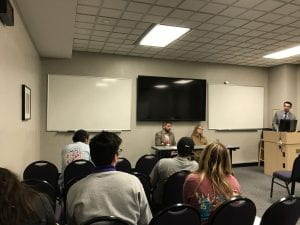
JMU Political Science Faculty Drs. Tim LaPira and Valerie Sulfaro talk about the impeachment process at a panel moderated by SMAD professor Ryan Alessi.
Moving beyond headlines, political science faculty experts Dr. Tim LaPira and Dr. Valerie Sulfaro provided insights into the impeachment process, how it works, what we might expect next and how it will affect politics on Monday, October 14. The panel was moderated by SMAD professor Ryan Alessi.
Dr. LaPira noted in his opening remarks that there are three things we should think about that are getting lost in the grand scheme of things:
- Congress acts autonomously. it’s the House that’s supposed to represent community of self-governors.
- House and Senate play different roles in the impeachment process. The U.S. Constitution clearly lays out responsibilities and in context of Article 1 which allows each chamber to effectively write their own rules of the process. They not only make decisions, but they also set the agenda. In the House, that is almost exclusively the prerogative of the majority party.
- Impeachment is and always has been a political act. Politics is not a four-letter word. Politics is a good thing. The impeachment process was left to politically-accountable representatives.
There is no clear guide book of what is impeachable or what’s not. It’s up to 435 members of the House to decide what’s impeachable. There are very few rules, prescriptions that the House needs to follow. Impeachment is more governed by informal institutions. The “Golden Rule” is that the majority party isn’t going to do what it doesn’t want to done to them when it’s in the minority.
Dr. Howard Lubert also attended the panel and noted the distinction that impeachment is a political process not a criminal process. When the framers of the U.S. Constitution were thinking about impeachment, there was a due process question. They had reservations about giving powers to Congress, but there was no better alternative. Dr. Lubert also noted that the framers also didn’t anticipate modern political parties.
Why was the panel organized? JMU senior public policy major Ethan Gardner noted that the panel was important for students because it provided an opportunity “to be informed about national processes and politics to hear different perspectives and range of expertise.” “Addressing impeachment and hyper-partisanship provide an important opportunity for political learning regardless of political beliefs,” said Dr. Carah Ong Whaley, associate director of the James Madison Center for Civic Engagement at JMU.

Recent Comments